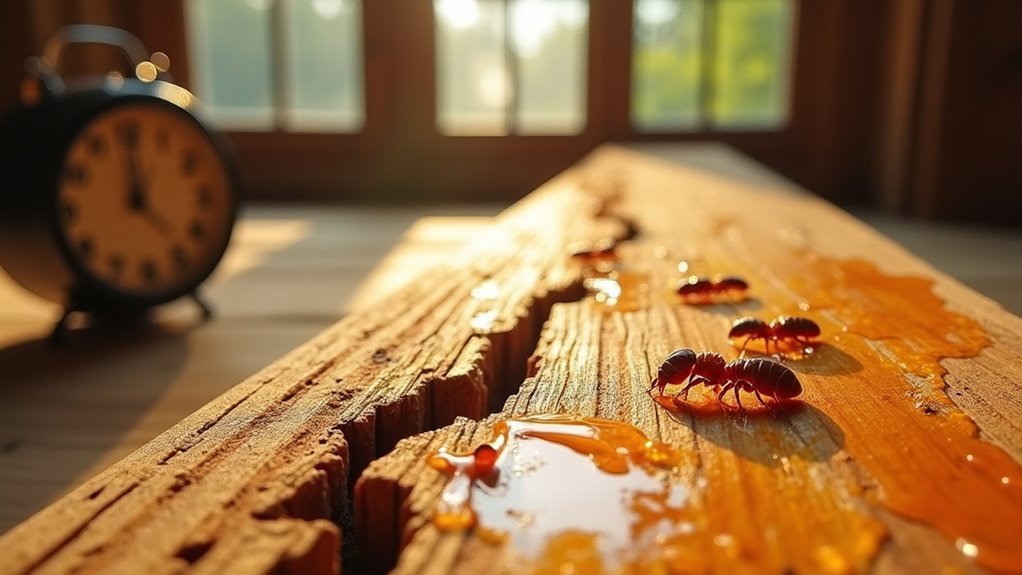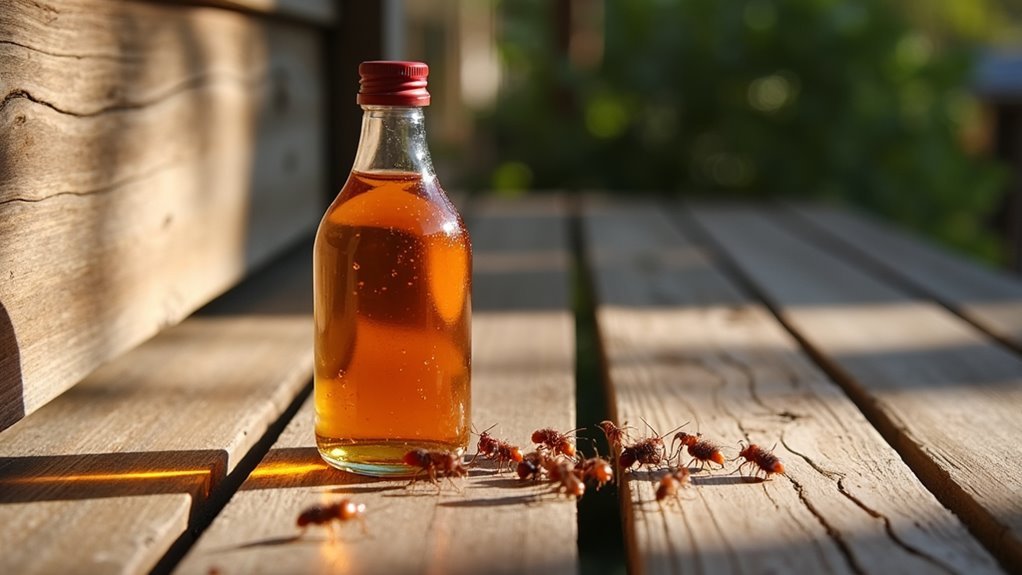Yes, orange oil does kill termites on contact through its active ingredient d-limonene, which dissolves their exoskeletons and causes rapid dehydration within minutes. However, it’s most effective against drywood termites and requires direct application through drilling and injection into infested wood. You’ll need reapplications every 3-7 days since it provides no residual protection and can’t penetrate deep enough to eliminate entire colonies. Understanding its limitations will help you make the right treatment decision.
What Is Orange Oil and How Does It Work Against Termites?

Orange oil emerges as a natural termite control solution derived from the peels of processed oranges. When you extract this oil, you’re getting a concentrated dose of d-limonene, the active compound that makes this termite treatment effective.
Here’s how it works: d-limonene dissolves termites’ exoskeletons on direct contact, causing rapid dehydration that kills them. You’ll find orange oil particularly effective against drywood termites, though it’s less successful with subterranean species since they remain hidden underground.
The application involves drilling into infested wood and injecting the oil directly where termites are active.
However, you shouldn’t expect permanent results. Orange oil provides temporary relief and requires reapplication every 3-7 days to maintain its effectiveness against ongoing infestations.
The Science Behind D-Limonene as a Termite Killer
You’ll find that D-limonene works through multiple mechanisms to eliminate termites at the cellular level.
The compound directly attacks termite exoskeletons by dissolving their protective waxy coating, causing rapid dehydration and death within minutes of contact.
It also penetrates cellular membranes in both adult termites and their eggs, disrupting essential biological processes that keep these pests alive.
D-Limonene’s Cellular Destruction Mechanism
At the molecular level, d-limonene acts as a powerful solvent that targets termites’ most vulnerable defense systems. When you apply orange oil directly to termites, the D-Limonene immediately begins breaking down their protective exoskeleton through dissolution. This process exposes their internal cellular structure to devastating damage.
The destruction unfolds in three devastating stages:
- Exoskeleton dissolution – D-Limonene penetrates and weakens the termite’s protective outer shell.
- Cell membrane rupture – Internal cellular walls break down, causing catastrophic structural failure.
- Dehydration cascade – Crucial proteins leak out while water escapes, leading to rapid death.
This mechanism allows D-Limonene to kill termites on contact, making it particularly effective against drywood termites.
However, you’ll need repeated applications since the compound’s effectiveness diminishes within days.
Orange Oil Contact Effectiveness
Three critical factors determine how effectively orange oil eliminates termites on contact: concentration levels, application method, and environmental conditions. When you apply orange oil for termite control, direct contact triggers immediate cellular breakdown, but you’ll notice variable results based on these conditions.
| Factor | High Effectiveness | Low Effectiveness |
|---|---|---|
| Concentration | 95%+ d-limonene | Below 70% d-limonene |
| Application | Direct spray contact | Indirect misting |
| Temperature | 70-85°F ideal | Below 60°F or above 90°F |
| Humidity | 40-60% range | Very dry or humid |
| Target Species | Drywood termites | Subterranean termites |
Traditional termite treatments often outperform orange oil because they don’t require direct contact. You’ll achieve best results when orange oil contacts termites directly under ideal environmental conditions.
Termite Exoskeleton Breakdown Process
When d-limonene makes contact with a termite’s body, it immediately begins dissolving the waxy protective layer that forms the outer exoskeleton.
This breakdown process triggers a cascade of fatal cellular damage that you can understand through three key stages:
- Waxy layer dissolution – The d-limonene penetrates and breaks down the protective coating, exposing vulnerable tissues beneath.
- Rapid moisture loss – Without the protective barrier, termites lose body fluids at an accelerated rate, leading to severe dehydration.
- Cellular membrane destruction – The chemical disrupts protein structures and damages cell walls, causing irreversible internal damage.
This termite exoskeleton breakdown occurs within hours of exposure, making orange oil treatments particularly effective against drywood termites when applied directly to infested areas.
Orange Oil vs. Traditional Chemical Termiticides: A Direct Comparison
While orange oil delivers immediate results by killing termites on contact through its active ingredient d-limonene, traditional chemical termiticides take a different approach by penetrating deep into structures to create long-lasting barriers that systematically eliminate entire colonies over weeks or months.
You’ll find that orange oil’s effectiveness drops considerably after just 3-7 days, requiring multiple applications. Traditional chemical termiticides maintain residual protection for extended periods, preventing future infestations.
Orange oil specifically targets drywood termites through direct injection into wood, while traditional treatments handle both drywood and subterranean species using various application methods including liquid injections, bait systems, and fumigation.
Though orange oil offers lower toxicity and environmental impact, traditional chemical termiticides provide more thorough eradication and longer-lasting protection against termite colonies.
Why Orange Oil Works Better on Drywood Termites Than Subterranean Species

You’ll find that orange oil’s effectiveness varies dramatically between termite species due to fundamental differences in their living conditions and accessibility.
Drywood termites infest wooden structures where you can directly target them through drilling and injection, making contact with the oil almost guaranteed.
In contrast, subterranean termites remain largely protected in underground colonies where your orange oil treatments can’t reach them effectively.
Drywood Termite Accessibility
Since drywood termites live directly within the wood they’re consuming, orange oil can reach them far more easily than their subterranean cousins.
You’ll find these pests creating galleries and tunnels inside wooden structures, making them perfect targets for direct treatment applications.
When you inject orange oil into infested wood, you can visualize:
- The oil flowing directly into termite galleries where colonies feed and nest
- Termites coming into immediate contact with the treatment as they move through their wooden highways
- The oil saturating the wood fibers where drywood termites spend their entire lives
This accessibility gives orange oil a significant advantage against drywood termites.
Unlike subterranean species that retreat to underground colonies, drywood termites can’t escape the treatment once it’s applied to their wooden habitat.
Subterranean Species Protection
Subterranean termites present a completely different challenge that makes orange oil far less effective against them. You’ll find these termites living underground in extensive colonies with complex tunnel systems that protect them from surface treatments. Unlike drywood termites that infest wood directly, subterranean species remain hidden in soil, making direct contact with orange oil nearly impossible.
| Factor | Drywood Termites | Subterranean Termites |
|---|---|---|
| Location | Inside wood structures | Underground colonies |
| Accessibility | Direct contact possible | Hidden in soil |
| Colony size | Smaller, localized | Extensive networks |
| Treatment duration | 3-7 days sufficient | Requires long-term control |
| Feeding pattern | Continuous wood contact | Periodic surface visits |
Effective termite control against subterranean species requires thorough barrier treatments rather than localized applications.
The Treatment Process: How Orange Oil Is Applied to Infested Areas
Three critical steps define the orange oil treatment process for termite elimination.
Orange oil treatment follows three essential phases that ensure complete termite elimination through systematic inspection, targeted injection, and thorough contact destruction.
When you’re dealing with a termite infestation, professionals follow a systematic approach that guarantees maximum effectiveness against these destructive pests.
- Inspection and Assessment – Technicians conduct a thorough examination to identify the specific type and extent of your termite infestation in all affected areas.
- Drilling and Injection – Small holes are drilled into infested wood to access hollow spaces where termites feed, then orange oil containing d-limonene is injected directly into these areas.
- Contact and Restoration – The oil spreads through capillary action, making direct contact with termites and destroying their exoskeletons and eggs, while drilled holes are patched and painted afterward.
Duration of Effectiveness: How Long Does Orange Oil Protection Last?

While orange oil delivers immediate results against active termite colonies, its protective benefits don’t last long after treatment.
You’ll typically see effectiveness diminish within 3 to 7 days post-application, leaving your property vulnerable to re-infestation. This short-lived protection means orange oil functions more as a temporary solution than a thorough termite treatment strategy.
You’ll need regular reapplications to maintain any protective barrier, especially in areas where subterranean termites are active.
The treatment targets existing infestations effectively but doesn’t prevent new termites from entering your space. If you’re dealing with an underlying infestation problem, orange oil won’t address the root cause, making re-infestation highly likely without additional preventive measures or professional intervention.
Safety Benefits of Using Orange Oil Around Children and Pets
How often do you worry about exposing your family to harsh chemicals when treating pest problems?
Orange oil offers remarkable safety advantages for termite control in homes with children and pets. Unlike synthetic pesticides, you won’t need to evacuate your family during treatment, making the process incredibly convenient.
Keep your family safe at home during termite treatment with orange oil’s natural protection instead of harsh chemical evacuations.
The safety benefits include:
- Natural composition – d-limonene from orange peels creates a non-toxic environment where kids can play safely on treated floors.
- No respiratory concerns – unlike chemical fumigants, you’ll breathe easily knowing the air quality remains safe for little lungs.
- Pet-friendly application – your furry family members can remain comfortable at home without health risks.
While direct contact may cause minor skin irritation, proper application guarantees orange oil provides effective pest control without compromising your family’s wellbeing.
Limitations of Orange Oil for Complete Termite Colony Elimination
While orange oil can kill termites on contact, you’ll find it has significant limitations when dealing with entire colonies.
The treatment can’t penetrate deep enough into wood structures or reach hidden areas where most termites actually live and breed.
You’ll also discover that orange oil provides no lasting protection, requiring you to repeatedly treat the same areas since its effectiveness only lasts 3-7 days.
Limited Colony Penetration
Although orange oil shows promise against drywood termites, it can’t penetrate deeply enough into wood structures to eliminate entire colonies. When you’re dealing with a termite infestation, you’ll find that orange oil only reaches termites in direct contact with treated areas.
The drilling process may seem thorough, but it doesn’t guarantee access to all termite galleries and chambers within your home’s wooden framework.
Here’s what limits orange oil’s colony penetration:
- Shallow drilling depth – You can only drill so far before compromising structural integrity.
- Complex tunnel networks – Termite galleries twist and branch in unpredictable patterns throughout wood.
- Hidden colony sections – Many termites remain in untreated areas beyond the oil’s reach.
This penetration limitation means surviving termites can rebuild and continue damaging your property.
No Residual Protection
Even if orange oil successfully contacts and kills termites during initial treatment, it provides no lasting protection against future invasions.
The d-limonene compound loses its effectiveness within 3-7 days, leaving your property completely vulnerable to new termite infestations. Unlike conventional termiticides that create protective barriers lasting months or years, orange oil can’t prevent colonies from returning to previously treated areas.
You’ll need constant reapplication every few days to maintain any level of protection, making it impractical for long-term termite control.
This lack of residual effect means you’re fundamentally starting from scratch with each treatment cycle. Without sustained protection, undetected termite colonies can quickly reestablish themselves, rendering your initial orange oil efforts ineffective against persistent infestations.
Requires Multiple Treatments
Because orange oil only works through direct contact, you’ll face the challenging reality of needing countless treatments to make any meaningful dent in a termite colony. This termite treatment demands persistent reapplication since hidden colony members continuously emerge from untreated areas.
Your orange oil applications must target three critical scenarios:
- Weekly spot treatments where you’ve observed fresh termite activity along baseboards and wooden structures.
- Monthly deep injections into wall voids where colonies establish satellite locations beyond your initial reach.
- Seasonal perimeter applications around foundation areas where subterranean termites create new entry points.
Each treatment cycle only addresses visible termites, leaving the vast underground network untouched.
You’re fundamentally playing an exhausting game of whack-a-mole, repeatedly treating symptoms while the core infestation thrives in inaccessible locations throughout your property’s structure.
Cost Analysis: Orange Oil Treatment vs. Professional Fumigation
When you’re weighing the financial impact of termite treatment options, orange oil might appear cheaper upfront, but the numbers tell a more complex story.
While orange oil offers lower initial costs, you’ll face ongoing expenses from required reapplications since it lacks long-lasting residual protection. For large infestations, orange oil becomes expensive due to localized drilling and application methods.
Professional fumigation costs more initially but provides thorough structural treatment that eliminates entire colonies and reaches inaccessible areas.
You’ll save money long-term by avoiding costly repairs from undetected infestations that orange oil might miss.
Consider hidden costs of ongoing termite damage when choosing orange oil’s temporary solution versus fumigation’s one-time thorough approach that guarantees complete eradication.
Signs That Orange Oil Treatment May Not Be Sufficient
Beyond the financial considerations, you need to recognize when orange oil simply won’t solve your termite infestation.
While orange oil can kill termites on direct contact, several warning signs indicate you’re dealing with a problem that’s beyond its capabilities.
Orange oil has limitations and won’t eliminate every termite problem you encounter in your home.
Watch for these red flags that suggest orange oil treatment isn’t sufficient:
- Persistent termite activity continues appearing in new locations despite repeated applications, indicating the colony extends beyond treated areas.
- Structural damage keeps spreading throughout your home, showing that hidden termites remain active in untreated wood sections.
- Multiple re-treatments within weeks become necessary, proving the short 3-7 day residual effect can’t control your infestation’s scope.
These signs typically mean you’re facing extensive colonies requiring professional intervention.
When to Combine Orange Oil With Other Termite Control Methods
While orange oil can effectively eliminate termites on contact, you’ll often achieve better results by strategically combining it with other termite control methods rather than relying on it as a standalone solution.
For extensive drywood termite infestations, you should use orange oil as an initial spot treatment to reduce the immediate population, then follow up with fumigation for thorough eradication.
Since orange oil works best against drywood species, pair it with bait systems targeting subterranean termites for complete coverage.
You can enhance overall effectiveness by combining orange oil with traditional termiticides, addressing both active infestations and providing longer-lasting protection.
Regular reapplication maintains protective barriers in vulnerable areas. Consulting pest control professionals helps determine the best combination tailored to your specific termite type and infestation severity.
Professional Assessment: Determining If Orange Oil Is Right for Your Infestation
Before investing in orange oil treatment, you need a detailed professional inspection to evaluate your termite problem’s scope and severity. A qualified professional pest control company can determine whether orange oil suits your specific infestation or if you’ll need more extensive solutions.
During a termite inspection, professionals assess:
- Hidden colony locations – Identifying termite galleries behind walls, under floors, and within structural beams where orange oil can’t penetrate effectively.
- Damage extent – Evaluating compromised wood structures that may require drilling for localized orange oil application.
- Treatment strategy – Determining if orange oil works as a standalone solution or needs integration with baiting systems and chemical barriers.
Professional expertise guarantees you’re not wasting money on ineffective treatments while potentially allowing termites to cause further structural damage.
Frequently Asked Questions
How Effective Is Orange Oil for Termites?
Orange oil’s effectiveness against termites is limited. You’ll find it kills drywood termites on contact but won’t eliminate entire colonies. It’s only temporarily effective, lasting 3-7 days, so you’ll need repeated applications.
What Is the Best Oil to Kill Termites?
You’ll find orange oil most effective for killing termites, as d-limonene provides strong contact action. Clove oil with eugenol also works well, while neem oil offers additional deterrent properties for thorough treatment.
What Are the Disadvantages of Orange Oil?
You’ll face limited coverage since orange oil only treats visible areas, lacks residual protection requiring frequent reapplication, involves invasive drilling, costs more than fumigation, and can’t eliminate entire colonies.
Is Orange Oil Better Than Fumigation?
You’ll find fumigation more effective than orange oil for complete termite elimination. While orange oil kills termites on contact, fumigation penetrates entire structures, reaches hidden colonies, and provides longer-lasting results than orange oil’s temporary effects.
In Summary
You’ll find that orange oil can effectively kill termites on contact, but it’s not a complete solution for every situation. If you’re dealing with drywood termites in localized areas, orange oil offers a less toxic alternative to fumigation. However, you shouldn’t rely on it alone for extensive infestations or subterranean termites. You’ll get the best results when you combine orange oil with professional assessment and potentially other treatment methods for thorough termite control.





Leave a Reply